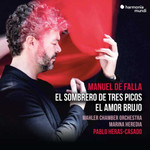|
Back
09/24/2019
Manuel de Falla: El sombrero de tres picos [1] – El amor brujo [2]
Carmen Romeu [1] (mezzo-soprano), Marina Heredia [2] (cantaora), Mahler Chamber Orchestra, Pablo Heras-Casado (conductor)
Recording: Auditori, Barcelona, Spain (April 2019) – 62’27
harmonia mundi HMM 902271 – Booklet in French, English and Spanish (Distributed by PIAS)

   
This highly energetic, effusive CD has an interesting angle of presentation. Conductor Pablo Heras-Casado, known for versatility and pliability, had a most impressive outlay in last year’s Debussy conveyance. Similarly, this harmonia mundi parlance dovetails in parallel fashion. And while the Granada-native reaches out to the Mahler Chamber Orchestra to extrapolate Falla’s highly-pulsated El sombrero de tres picos and frenetic El amor brujo, the format is condensed. In some instances the relay is symphonically shallow (chamber orchestra), yet some of these ‘economies’ yield richer results in terms of instrumental digestion (i.e. cor anglais, bassoon, flute and brass.) In summation, Pablo Heras-Casado has an evocative direction with intriguing quality.
Regarding El sombrero de tres picos, the expertise stemming from Pablo Picasso (sets and costumes), Léonide Massine (choreography) and Manuel de Falla (music) back in 1919 [likely] could only be described as a wonderment. That said, the Heras-Casado tempi are somewhat stultifying. Example: Carmen Romeu’s vocal “Introduction” is startlingly fast...perhaps too fast. Nonetheless, percussive explanations (i.e. castanets) make the entrée a true ‘attention getter.’ Much of the dynamics are in place, though unexpected pacing appears ‘at every corner’, such as during “Las Uvas”...truly lovely, but it’s running at breakneck speed (this is ballet.) Conversely, the “Farruca” has almost a dry indolence at the outset, seemingly uncharacteristic for the miller. All in all, Le Tricorne trends mildly off-kilter.
What makes Heras-Casado’s ‘take’ a compelling one, however, is the fact that more intimacy is at play. We find cleaner instrumental depictions and stricter envelopes of intensity. The listener will be held in aberrant fascination. With a chamber orchestra comes a more fortified piano dialogue, yielding a more contemporary fit.
For a reviewer who’s assiduously listened to this ballet piece on a larger orchestral scale for over 45 years, Pablo Heras-Casado’s chambered argument has a ‘fresh face.’
Grander strength exists within El amor brujo, and in this ballet version the announcement is richly defined. M. Heras-Casado moves into a deeper personal plane; veins of contrast act well together: The “Pantomima” gives the listener a moment to breathe (with solo violin piercing the airways) after decompressing from the buzz-stringed “Ritual Fire Dance” and a sharply blistering cor anglais rendition during the “Escena”.
El amor brujo could be characterized as a series of well-defined tableaux which have a vocal foundation. Cantaora, Marina Heredia, makes the entire piece rise with magic. She passages through the emotional storyline with a raw, but penetrating blister. There’s no filtration, just truth stripped down to basics and full of throaty narration. We feel we’ve been transplanted into the Andalusian caves outside Granada. Mlle Heredia’s sound makes the piece come alive in the strictest sense of the word: she penetrates the soul in a feisty, warm-blooded and beguiling sort of way.
The Mahler Chamber Orchestra, a nomadic collective reigning from 20 different core countries, has its own sense of centered values and independence. The aforementioned is just what we experience in this CD. The immersion is mystically vibrant.
Christie Grimstad
|